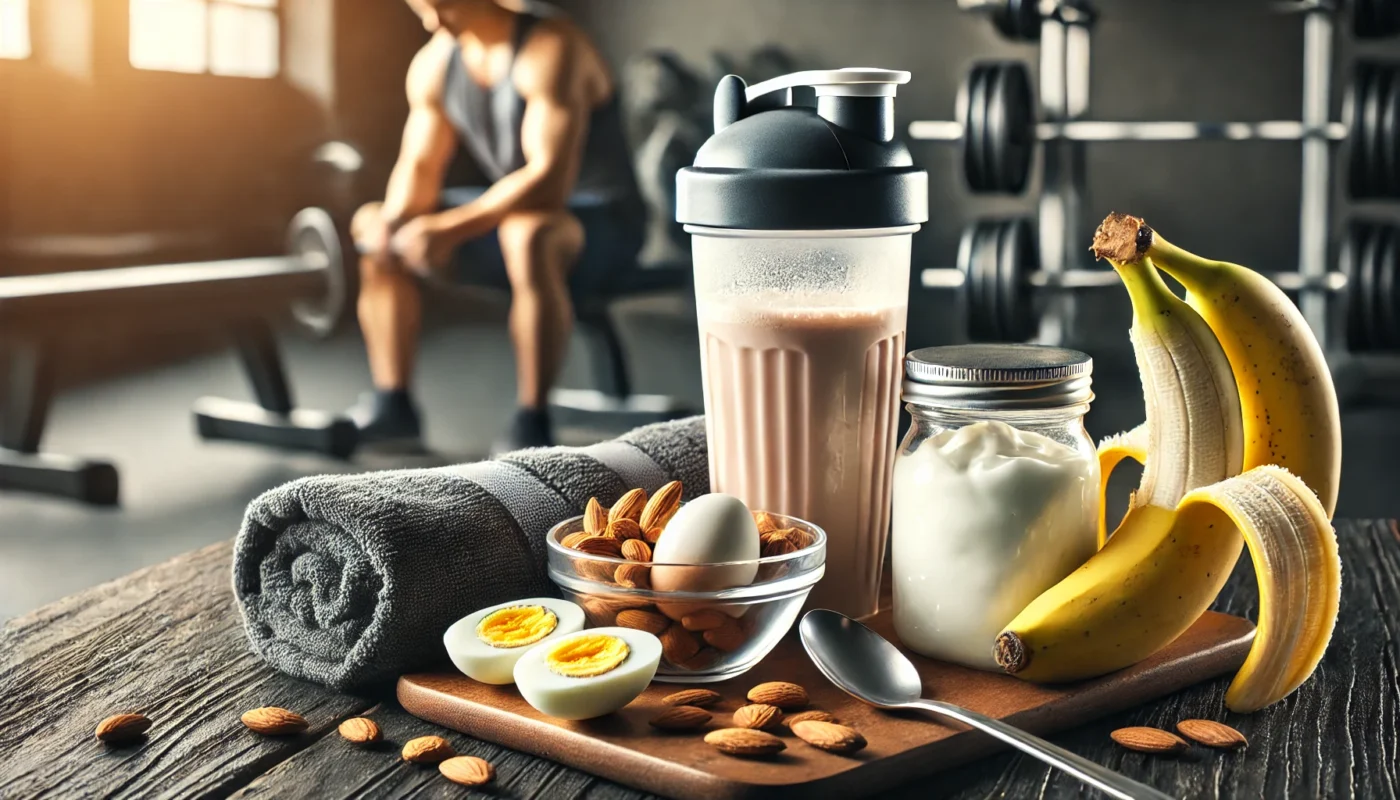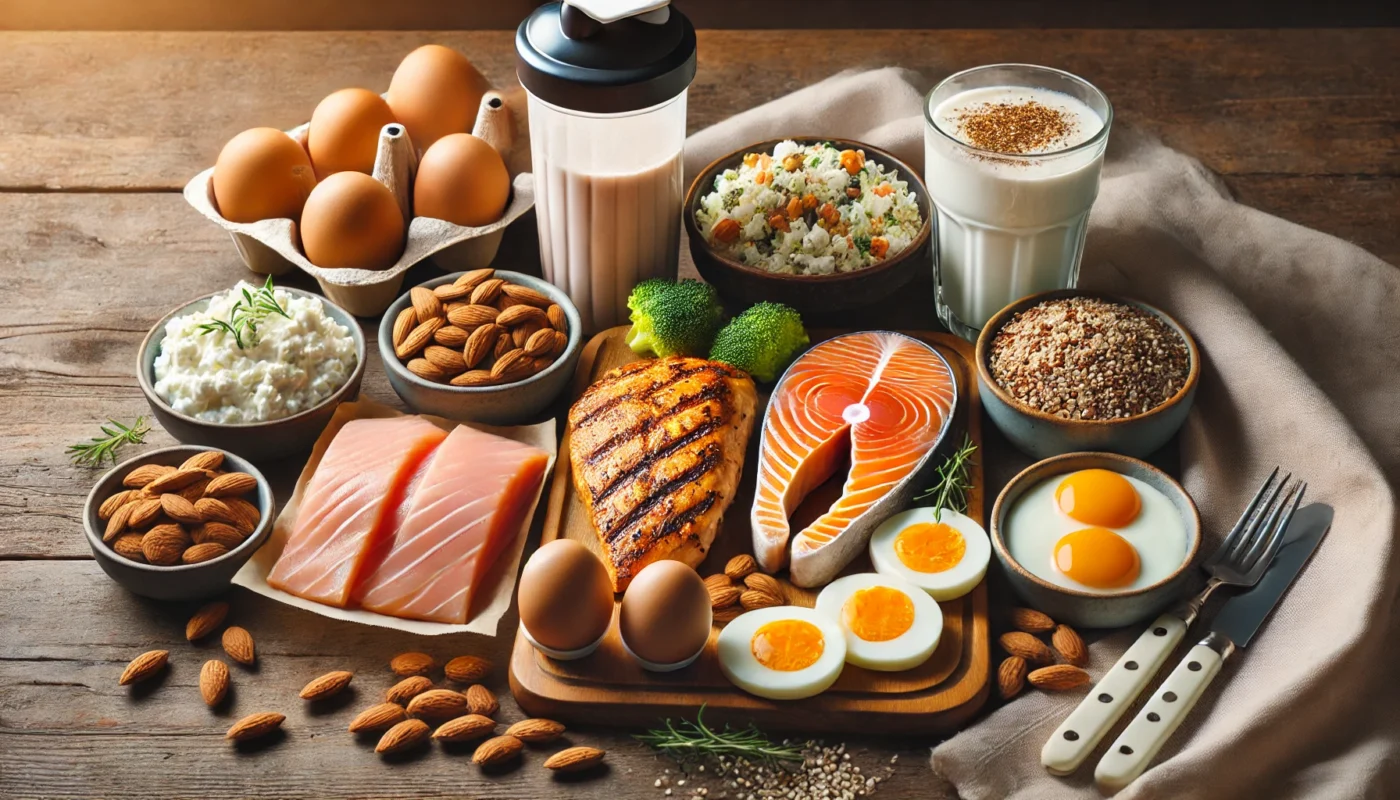When it comes to muscle recovery, protein plays a pivotal role. As a fitness enthusiast, health aficionado, or someone recovering from an injury, understanding the intricate processes of muscle recovery and the part protein plays in it can be enlightening. This article delves into the science behind protein’s role in muscle recovery, providing you with actionable insights that are both practical and grounded in scientific evidence.
You may also like: High Protein Foods to Fuel Workouts

The Science of Muscle Recovery
Muscle recovery is a complex physiological process where muscle fibers repair and grow after being stressed through exercise or injury. This process involves inflammation, the removal of damaged cells, and the synthesis of new proteins to repair and build muscle tissue.
The Inflammatory Response
When muscles undergo stress during exercise, inflammation is one of the body’s first responses. This inflammation is not inherently harmful; rather, it’s a crucial part of the healing process. The body sends immune cells to the damaged area to help clear away debris and initiate repair. This phase is essential as it paves the way for subsequent healing and growth.
Cellular Repair and Regeneration
Following the initial inflammatory response, the body starts the process of cellular repair. Damaged muscle fibers are removed and new cells are generated to replace them. This phase relies heavily on the availability of amino acids, which are the building blocks of proteins, underscoring the importance of dietary protein in recovery.
Protein Synthesis and Muscle Growth
Protein synthesis is the process where cells build new proteins, playing a direct role in muscle growth and repair. After exercise, protein synthesis rates increase, leading to the rebuilding and strengthening of muscle fibers. This phase ensures that muscles adapt to the stress they’re subjected to, becoming stronger and more resilient over time.
Protein’s Role in Muscle Synthesis
Protein is composed of amino acids, which are the building blocks of muscle tissue. During the recovery phase, your body requires a sufficient supply of these amino acids to repair damaged muscle fibers and facilitate the growth of new ones. This is where dietary protein becomes crucial.
Amino Acids and Their Importance
Amino acids are categorized into essential and non-essential types. Essential amino acids cannot be synthesized by the body and must be obtained from the diet. These are crucial for muscle repair and growth, highlighting the importance of consuming high-quality protein sources.
The Timing of Protein Intake
Research indicates that consuming protein shortly after exercise can significantly enhance muscle protein synthesis, leading to improved recovery and adaptation. The timing of protein intake is crucial; consuming protein within a ‘window’ post-exercise can optimize recovery. This timeframe is often referred to as the ‘anabolic window,’ typically lasting for up to two hours after exercise.
Quantity and Quality of Protein
The question then becomes, how much protein is necessary, and when should it be consumed? The quality of protein matters as much as the quantity. Opt for complete protein sources, which contain all essential amino acids, to maximize muscle recovery. Balancing intake throughout the day, rather than consuming it all in one go, can also enhance muscle protein synthesis.
How Much Protein Do You Need?
The amount of protein required can vary based on several factors, including your level of physical activity, age, and overall health.
Factors Influencing Protein Needs
Individual protein requirements are influenced by factors such as age, gender, body composition, and specific fitness goals. Athletes and older adults often have increased protein needs due to higher rates of muscle protein breakdown and synthesis.
Guidelines for Protein Intake
For those looking to maintain muscle mass, the general guideline is to consume around 0.8 grams of protein per kilogram of body weight daily. However, active individuals or those in recovery may need more. For muscle building, a range of 1.2 to 2.2 grams per kilogram of body weight is recommended, tailored to individual needs.
The Role of Protein Timing
The timing of protein intake is also crucial. Consuming protein shortly after exercise can optimize muscle protein synthesis, supporting quicker recovery and adaptation. Spacing protein intake evenly throughout the day can further enhance the body’s ability to repair and grow muscle tissue.

Can You Build Muscle Without Protein?
A common question among fitness enthusiasts is whether it’s possible to gain muscle without protein.
The Necessity of Protein
Protein is essential for muscle growth and recovery. While it’s theoretically possible to build muscle with minimal protein by relying on other energy sources, such as carbohydrates and fats, this approach is not optimal. Protein provides the critical amino acids needed for muscle repair and growth, making it an indispensable component of an effective muscle-building strategy.
The Role of Alternative Macronutrients
Carbohydrates and fats are important for providing energy and supporting overall health. They play a supportive role in muscle recovery but cannot replace protein’s unique function in muscle repair. Balancing these macronutrients with adequate protein intake ensures comprehensive nutritional support for muscle growth.
Long-Term Implications of Protein Deficiency
A prolonged deficiency in protein can lead to muscle loss, weakened immune function, and slower recovery from exercise and injury. Ensuring adequate protein intake is vital for long-term health and fitness, preventing these potential negative outcomes.
Practical Strategies for Increasing Protein Intake
If you’re looking to increase your protein intake, there are several practical strategies you can implement.
Whole Foods vs. Supplements
Whole foods should be your primary source of protein. Foods like lean meats, fish, eggs, dairy, beans, and legumes are excellent sources of high-quality protein. However, if you’re struggling to meet your protein needs through diet alone, supplements like whey protein or plant-based protein powders can be a convenient addition.
Meal Planning and Preparation
Incorporating protein-rich foods into every meal can help you meet your daily requirements. Plan meals ahead to ensure a balanced intake, including snacks that are rich in protein, such as Greek yogurt or nuts. Preparation is key to maintaining consistent protein consumption.
Timing and Distribution
To maximize muscle protein synthesis, aim to distribute your protein intake evenly across meals. Consuming 20-30 grams of protein per meal can be an effective strategy. Additionally, consuming a protein-rich snack or shake post-workout can further enhance recovery. Spacing protein intake throughout the day helps maintain a steady supply of amino acids for muscle repair.
The Role of Protein in Bulking
The term “bulking” refers to a phase where the goal is to gain muscle mass. During this phase, protein intake becomes even more critical.
Understanding Bulking Phases
Bulking involves consuming more calories than the body needs to support muscle growth, typically combined with intensive strength training. Protein plays a crucial role during this phase by providing the necessary building blocks for muscle synthesis and repair.
Does Protein Make You Bulk?
Protein itself does not cause you to bulk. Bulking is a result of consuming more calories than your body needs, combined with strength training. Protein supports muscle growth during this phase by providing the necessary building blocks for muscle synthesis.
Balancing Caloric Surplus and Protein
For effective bulking, maintain a caloric surplus while ensuring adequate protein intake. This approach supports muscle growth while minimizing fat gain. Balancing the surplus with nutrient-dense foods, including sufficient protein, enhances muscle-building efficiency.
Protein and Injury Recovery
For those recovering from surgery or injury, protein plays a vital role in healing and regaining strength.
The Healing Process and Protein
Protein supports tissue repair and immune function, both of which are crucial during recovery. Ensuring an adequate protein intake can accelerate the healing process and support the rebuilding of strength and function. Amino acids derived from protein help synthesize new tissues, essential for recovery.
Protein Requirements During Recovery
Recovery from injury may increase protein needs to support tissue repair and prevent muscle loss. Tailoring protein intake to meet these increased demands can facilitate quicker healing and rehabilitation. Consulting with a healthcare professional can help determine the optimal protein intake for specific recovery needs.
Combining Protein with Other Recovery Strategies
While protein is vital, integrating other recovery strategies such as physical therapy, rest, and a balanced diet can enhance healing. Combining these approaches ensures comprehensive support for recovery, leveraging the benefits of protein in conjunction with other interventions.

Conclusion
Protein is an indispensable component of muscle recovery, whether you’re an athlete looking to improve performance, a fitness enthusiast aiming to build muscle, or a medical patient recovering from injury. By understanding the role protein plays and implementing practical strategies to optimize your intake, you can enhance your muscle recovery process and achieve your health and fitness goals.
Remember, while protein is vital, it’s just one piece of the puzzle. A balanced diet, adequate rest, and consistent exercise are equally important in promoting optimal health and recovery. Embracing a holistic approach that combines nutrition, lifestyle, and exercise will lead to the best outcomes in muscle recovery and overall well-being.
muscle recovery, protein synthesis, amino acids, fitness, nutrition, injury recovery, dietary protein, muscle growth, bulking, exercise recovery, protein intake, health, strength training, meal planning, protein sources
Further Reading:
Here’s Exactly How Much Protein You Need
How Does Eating Protein Help You Build Muscle?
26 Foods to Eat to Gain Muscle
Important Note: The information contained in this article is for general informational purposes only, and should not be construed as health or medical advice, nor is it intended to diagnose, prevent, treat, or cure any disease or health condition. Before embarking on any diet, fitness regimen, or program of nutritional supplementation, it is advisable to consult your healthcare professional in order to determine its safety and probable efficacy in terms of your individual state of health.
Regarding Nutritional Supplements Or Other Non-Prescription Health Products: If any nutritional supplements or other non-prescription health products are mentioned in the foregoing article, any claims or statements made about them have not been evaluated by the U.S. Food and Drug Administration, and such nutritional supplements or other health products are not intended to diagnose, treat, cure, or prevent any disease.

